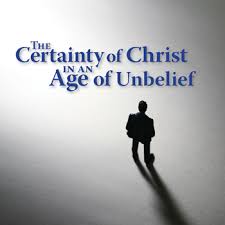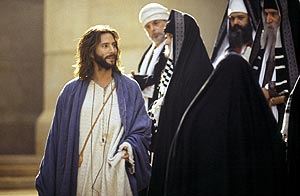 Those of us who are working within the branch of Christian theology known as “apologetics,” often have a rugged hill to climb in clarifying the purpose and goal of apologetics in evangelism to those within the Church, and thereby, convincing the ‘skeptics’ within the Church of its value and place within the evangelistic framework. I have often found it somewhat perplexing that the skepticism within the Church is at times stronger than that of the skeptics whom we engage outside the Church, as many skeptics, agnostics, and even atheists see the arguments and evidence for the Christian faith as a strong and viable challenge to their worldview, one in which they expend great effort to try and refute.
Those of us who are working within the branch of Christian theology known as “apologetics,” often have a rugged hill to climb in clarifying the purpose and goal of apologetics in evangelism to those within the Church, and thereby, convincing the ‘skeptics’ within the Church of its value and place within the evangelistic framework. I have often found it somewhat perplexing that the skepticism within the Church is at times stronger than that of the skeptics whom we engage outside the Church, as many skeptics, agnostics, and even atheists see the arguments and evidence for the Christian faith as a strong and viable challenge to their worldview, one in which they expend great effort to try and refute.
The resistance to apologetics can be summed up in the statement, “you can’t argue someone into the Kingdom.” I agree wholeheartedly, but with strong qualifications. These qualifications have been expressed by Greg Koukl who states:
In an interview with John D. Martin, William Lane Craig addresses the criticisms of apologetics and presents the biblical position and support of apologetics and its relevance to Christian evangelism today:
Craig: What I say is, just as the Holy Spirit can use preaching, He can also use apologetics and arguments to draw someone to Himself. The key here is to realize that the Holy Spirit uses means. He uses means by which to draw people to Himself. There’s no reason to think that He can’t use argument and evidence, just as much as preaching. When you look at the book of Acts, that’s exactly the way Paul operated. He would argue with people. He would hold lectures in the hall of Tyrannus. He would discuss these things with the philosophers on Mars Hill. I find, in dealing with people from a Charismatic or Pentecostal background, that the most effective thing to do is simply to let them see you use arguments in evangelism. And they get excited. It’s only because they haven’t seen it done effectively that they’re skeptical. I just came from a large Assemblies of God Church in Edmonton, Canada, a couple of weeks ago, where we had over 900 people in the 20-some age range. I spoke of the absurdity of life without God, and they just ate it up. You can’t just go on emotions and be a whole person. Even folks in this sub-culture of Charismatic and Pentecostal Christianity have minds that want answers. When they see it in action, coupled with passionate commitment to Christ, they love it, too. They really eat it up. [2]
 To hold to the position that apologetics—arguments/evidence—have no place in Christian evangelism, and that of helping to bring a soul to the saving knowledge of Christ, is to deny Jesus’ evangelistic methodology and to discount the entire apologetic methodology used throughout the Acts of the Apostles. I will offer several examples to illustrate my point.
To hold to the position that apologetics—arguments/evidence—have no place in Christian evangelism, and that of helping to bring a soul to the saving knowledge of Christ, is to deny Jesus’ evangelistic methodology and to discount the entire apologetic methodology used throughout the Acts of the Apostles. I will offer several examples to illustrate my point.
The following example, of which there are many, of the use of logic in argument by Jesus is taken from the excellent article by Douglas Groothuis, Jesus: Philosopher and Apologist:
Jesus was fond of what are called a fortiori (Latin: “from the stronger”) arguments, which often appear in pithy but persuasive forms in the Gospels.15 We use them often in everyday arguments. These arguments have the following form:
1. The truth of idea A is accepted.
2. Support for the truth of idea B (which is relevantly similar to idea A) is even stronger than that of idea A.
3. Therefore, if the truth of idea A must be accepted, then so must the truth of idea B be accepted.
Consider Jesus’ argument against the Pharisees concerning the rightness of His performing a healing miracle on the Sabbath:
I did one miracle [on the Sabbath], and you are all astonished. Yet, because Moses gave you circumcision (though actually it did not come from Moses, but from the patriarchs), you circumcise a child on the Sabbath. Now if a child can be circumcised on the Sabbath so that the law of Moses may not be broken, why are you angry with me for healing the whole man on the Sabbath? Stop judging by mere appearances, and make a right judgment. (John 7:21–24)
Jesus’ argument can be laid out simply:
1. The Pharisees endorse circumcision, even when it is done on the Sabbath, the day of rest from work. (Circumcision was performed eight days after the birth of a male, which sometimes fell on the seventh day of the week, the Sabbath.) This does not violate the Sabbath laws, because it is an act of goodness.
2. Healing the whole person is even more important and beneficial than circumcision, which affects only one aspect of the male.
3. Therefore, if circumcision on the Sabbath is not a violation of the Sabbath, neither is Jesus’ healing of a person on the Sabbath.
Jesus’ concluding comment, “Stop judging by appearances, and make a right judgment,” was a rebuke to their illogical inconsistency while applying their own moral and religious principles. [3]
In his excellent article, The Apologetics of Jesus: Survey and Significance, Norman Geisler covers the nine different ways in which Jesus used apologetics effectively in His witness:
Moving on to the Apostle Paul; who routinely reasoned and/or argued with people wherever he went, I would like to focus upon his time in Athens and his presentation to the Epicurean and Stoic philosophers. We pick up the story with Paul conducting his street, or should I say, marketplace ministry:
philosophers. We pick up the story with Paul conducting his street, or should I say, marketplace ministry:
The Greek word for reasoned is dialegomai, whose definition is:
to ponder, revolve in mind
to converse, discourse with one, argue, discuss
Luke accurately described Paul’s evangelistic methodology by using the word dialegomai: that of reasoning, entering into dialogue, to converse, argue or discuss. Paul additionally attempted to “persuade” (Greek: peitho) his hearers to accept the truth and many did respond this way. This word describes the attempt to change a person’s mind by the application of reason and also involves endeavoring to prevail in the discussion by winning them to one’s viewpoint. [4] Paul combines both a classical and an evidential apologetic, one that employs reason and fact, and is both rational and empirical. Throughout his evangelistic outreach, Paul employed what has been referred to as a resurrection apologetic. Every one of his witnessing presentations was an apologia for the resurrection.
It is obvious when studying Paul’s address at the Areopagus, that Luke captured a text book example of “being always ready to make a defense to anyone who asks you for the reason of the hope that is in you, doing so with gentleness and respect.” (1 Peter 3:15) Peter May offers the following ‘bullet points’ that can be found within Paul’s presentation found in Acts 17:
The unknown God, verse 23
The transcendent Creator, verse 24
The sustaining God, verse 25
Human unity and equality, verse 26
Seeking and finding, verse 27
The immanence of God, verses 27, 28
Man made in his likeness, verse 29
Morally accountable, verse 30
Righteous judgment by the risen Christ, verse 31 [5]
 It is my prayer that the Lord will add to the church daily, such as will answer the call of adding apologetics to their evangelistic approach. It is biblical, and it was how the Christian faith was born, from Peter’s first sermon at Pentecost, (Acts 2:14-40) to Stephen’s farewell sermon, (Acts 7) to Paul’s defense before Felix and King Agrippa, (Acts 24:10-21; 26:2-23). Let us carry on in the tradition of those who have gone before us, looking unto Jesus, the author and finisher of our faith.
It is my prayer that the Lord will add to the church daily, such as will answer the call of adding apologetics to their evangelistic approach. It is biblical, and it was how the Christian faith was born, from Peter’s first sermon at Pentecost, (Acts 2:14-40) to Stephen’s farewell sermon, (Acts 7) to Paul’s defense before Felix and King Agrippa, (Acts 24:10-21; 26:2-23). Let us carry on in the tradition of those who have gone before us, looking unto Jesus, the author and finisher of our faith.
“The object of apologetics is not to antagonize or humiliate those outside the church, but to help open their eyes to the reality, reliability, and relevance of the Christian faith…Apologetics is about persuading people that there is a door to another world–a door that perhaps they never realized existed. Evangelism is about helping people to open that door and enter into the new world that lies beyond.”–Alister E. McGrath, Mere Apologetics
Are Evangelism and Apologetics Complimentary?–One Minute Apologist
Bobby answers whether or not evangelism and apologetics can help one another.
What is the Role of Apologetics in Evangelism–William Lane Craig
A special HBU Convocation featuring a discussion between William Lane Craig and Lee Strobel on the campus of Houston Baptist University.
Resources:
[1] Greg Koukl, Tactics, Zondervan, 2009, pg. 36
[2] William Lane Craig, Interview with John D. Martin, Boundless, http://www.reasonablefaith.org/a-few-minutes-with-dr-william-lane-craig-interview-by-john-d-martin#ixzz42h2zseyC
[3] Douglas Groothuis, Jesus: Philosopher and Apologist, http://www.equip.org/article/jesus-philosopher-and-apologist/
[4] Gary R. Habermas, The Resurrection of Jesus, pg. 172, 1984
[5] Peter May, Paul at Athens, http://www.bethinking.org/apologetics/paul-at-athens








